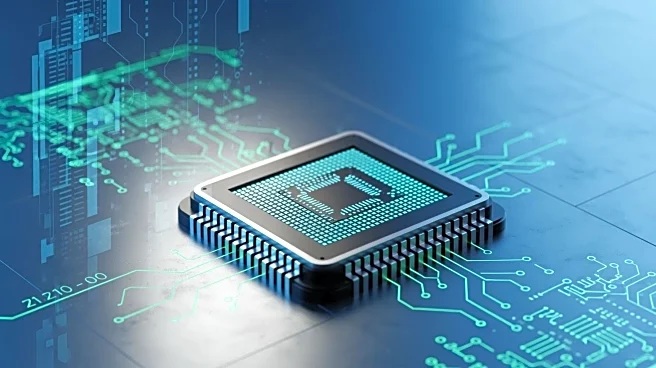What's Happening?
Researchers at Peking University have developed analogue computers that could significantly enhance the speed and efficiency of artificial intelligence (AI) training. Unlike digital computers, which process
data in binary form, analogue computers use continuously varying quantities such as electrical resistance. This allows them to solve specific problems more rapidly and with less energy consumption. The team, led by Zhong Sun, has created analogue chips capable of solving matrix equations, a fundamental component in AI model training. These chips can potentially outperform high-end digital chips like Nvidia's H100 GPU in terms of throughput, while using significantly less energy. The research suggests that analogue computing could offer a 1000-fold increase in speed and a 100-fold reduction in energy use compared to current digital methods.
Why It's Important?
The development of analogue computers for AI training could have substantial implications for the tech industry, particularly in reducing the energy demands of data centers. As AI models grow in complexity, the energy required for training them has become a significant concern. By offering a more energy-efficient alternative, analogue computing could help mitigate the environmental impact of AI technologies. This advancement could also lead to cost savings for companies relying on AI, as energy consumption is a major operational expense. Furthermore, the increased speed of AI training could accelerate innovation and deployment of AI applications across various sectors, enhancing productivity and technological advancement.
What's Next?
The researchers acknowledge that while their current chips are limited to solving smaller matrix problems, scaling up the technology could enable it to handle the larger matrices used in today's AI models. The potential development of hybrid chips, combining digital and analogue circuits, could further enhance computing capabilities. However, practical implementation of these technologies in commercial AI systems may still be several years away. Continued research and development will be necessary to overcome current limitations and fully realize the benefits of analogue computing in AI training.
Beyond the Headlines
The shift towards analogue computing in AI training could also prompt a reevaluation of current computing paradigms, emphasizing specialized solutions over the universal applicability of digital computers. This could lead to a broader diversification of computing technologies, each optimized for specific tasks, potentially reshaping the landscape of the tech industry. Additionally, the environmental benefits of reduced energy consumption align with global efforts to combat climate change, highlighting the role of technological innovation in achieving sustainability goals.










